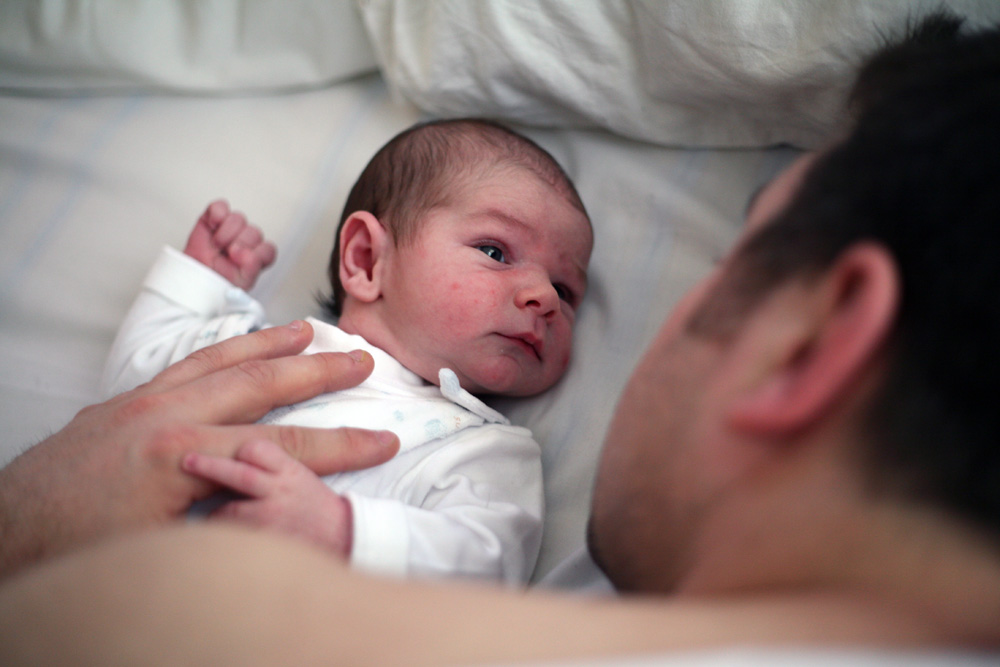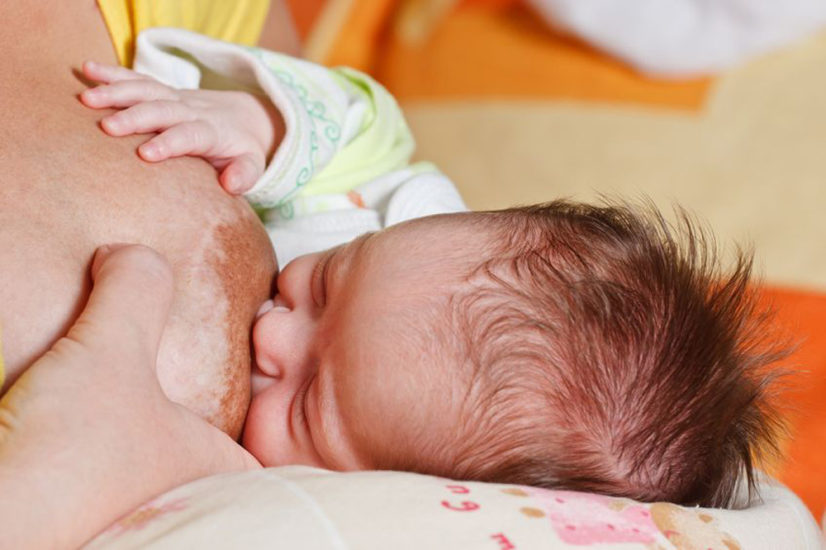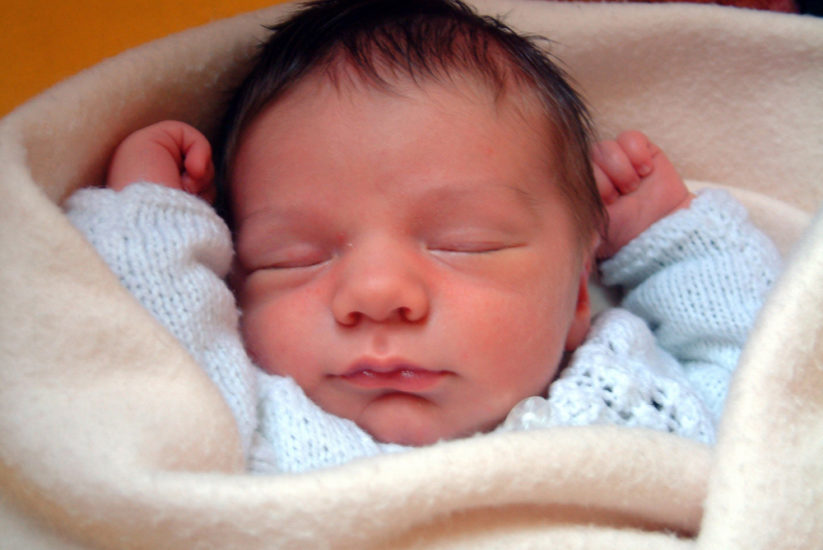Baby Waking to Feed at Night Again
A common question breastfeeding mothers have is how to cope with their baby waking up at night. They may be feeling exhausted or even resentful about constantly broken sleep. Or they may have been told it is not normal for a baby to wake at night after a few weeks of age and that their baby is manipulating them and needs to learn to "self-soothe". Some mothers may wonder whether to try night weaning, sleep training or whether to stop breastfeeding to find the answer to unbroken sleep. This article reviews the reasons babies wake at night, suggests coping strategies and answers frequently asked questions about night waking.
Night waking is normal
From a baby's point of view it is developmentally normal to wake up at night1 2 at least through the first year and often for quite a while longer. At first babies mostly wake for breast milk at night (they are trying to double their birthweight in their first four to six months; they need to eat often!). Later babies and toddlers might wake from hunger, loneliness or any of the reasons we might wake up ourselves as adults—whether needing a drink, the toilet, too hot or too cold, having toothache, a bad dream, not properly tired, being poorly and more. Evolutionary Parenting discuss reasons babies and toddlers wake at night in Reasons Babies Cry and Wake at Night and Reasons Toddlers Wake (and Sometimes Cry) At Night.

But I need more sleep!
It can help to know that by responding to your baby's needs you are helping him feel safe and secure, and that he is not "manipulating you" and neither a pre-schooler nor a baby are capable of plotting to keep you awake. However if your baby constantly wakes every hour or two through the night you may be feeling desperate for longer stretches of sleep. Finding other mothers who are going through the same and learning from those who have come through the other side can be a good place to start e.g. try a La Leche League meeting. The following article from Ask Dr Sears also has some helpful tips that share the experiences of other mothers:
Coping with baby waking up at night
#1 Sleep when your baby sleeps
Accepting that your baby has nighttime needs for this short time in his life and trying to work around them may help make night feeds more manageable. Some mothers find combinations of going to bed earlier, napping when their baby naps in the day or putting baby to bed later can help. Others find not checking the clock at night and not counting the number of times they wake are helpful. Attending to your baby promptly and quietly in subdued light, can help you breastfeed him back to sleep quickly without him waking fully and expecting to play.
#2 Sleep close to your baby
Worldwide and throughout history mothers have found that breastfeeding has been made easier at night if they keep baby close or take their baby into bed with them and feed lying down; both mother and baby sleep better this way. There are ways to prepare a sleeping surface for safe shared sleep and it is far better to be pre-prepared than to bring baby to bed without addressing the safety issues. If you are interested in reading more about how to co-sleep safely have a look at Bed-Sharing With Baby and Sweet Sleep: Nighttime and Naptime Strategies for the Breastfeeding Family, LLLI, 2014. You can read my review here.
#3 Co-sleeper crib
There are several ways to keep baby close at night. Some mothers keep their babies in bed with them all or part of the night but others prefer a cot or crib attached to the bed. Always check reviews and follow manufacturer's safety instructions carefully if using this type of cot. Some families put baby in their own cot in the mother's room; while others sleep next to their baby on a mattress on the floor.
#4 New sleep triggers
An older baby may still wake up often at night and need a breastfeed to fall back to sleep without being hungry. The breast is your baby's sleep trigger where a comfy pillow might be yours; if you woke up to find your pillow missing in the night you would most likely need to find it to return to sleep! Assuming your baby isn't hungry or poorly, the key to encouraging your baby to sleep for longer stretches without leaving them to "cry it out" is to help them associate falling asleep with a new sleep trigger instead of the breast. The No-Cry Sleep Solution by Elizabeth Pantley makes suggestions of how to gently and gradually introduce new sleep associations for a breastfed baby without leaving them to cry.
Frequently asked questions
Why is my older baby suddenly waking more at night?
Reasons older babies might start to wake more frequently after a period of sleeping longer stretches include:
- Too busy to breastfeed. As babies grow they become more aware of their surroundings. Typically around four months of age is a common time when mothers notice their baby may be forgetting to breastfeed in the day as they are easily distracted by siblings and new adventures. This can mean they wake more at night to breastfeed to make up their calories. For more information and tips to help with this see The Fussy Breastfed Baby.
- New developmental stage.It is quite common for a baby who previously slept through the night to start waking more at night once they are mastering a new skill. Developmental changes such as learning to roll over, crawl, toddle, teething, or a growth spurt can all affect night waking and this can continue for quite some time in cycles.
- Hunger. It's accepted that tiny babies wake at night because they are hungry. But older babies can do this too particularly if they have been busy during the day (see above) or you have a low milk supply. If your baby has a lot of trouble sleeping, fusses at the breast and has poor weight gain review their growth chart with your health professional and contact a breastfeeding specialist to maximise your milk supply.
- Illness. If your baby is unexpectedly waking at night or finding it difficult to sleep, check whether they could be poorly. Ear ache or teething pain are common causes for difficulty sleeping. A breastfeed is a great comfort for a baby or toddler who is not feeling well.
- Reverse cycling. If you have recently gone back to work or are busy with time away from your baby; increased night waking can be a reaction to spending less time in your arms during the day. Some babies don't feed well in "child care" and prefer to make up for missed breast milk at night by reverse cycling (feeding frequently at night).
Will solids stop baby waking up at night?
Babies wake in the night for many reasons (see above) and not just hunger. Carlos Gonzalez a Spanish paediatrician points out that many older children wake at night even after a substantial dinner;
Myth—with a good solid food feeding before bed, he'll sleep all night
Well, no. Many children continue to wake every night even at two or three years old, even if they had potatoes and eggs or beans with sausage for dinner. It has been demonstrated, that children do not sleep more when they have solids.
For more information on whether offering solids is the way to a good nights sleep for a young baby see Will giving formula or solids at night help baby to sleep better? by Kelly Bonyata, 2018.
Hungry baby
If you are worried that your baby is hungry see Is my Baby Getting Enough Milk? and How to Make More Breast Milk. If your baby is approaching six months of age see Starting Solid Food for further information.

Is my milk good enough?
Breast milk doesn't stop being beneficial or nutritional at any time. Your milk is perfect for your baby. Studies have shown very little difference in the milk of healthy mothers and mothers who have a very poor diet. For more information about how a mother's diet may affect her milk seeMother Food and Best Breastfeeding Diet and Foods to Avoid. Rather than the quality of a mother's milk being a cause of night waking, a more likely scenario would be the baby who is not gettingenough breast milk. Most cases of low weight gain are related to insufficient milk intake or an underlying health problem in the baby. Note: some babies with extremely low gain may sleep very well at night and be "happy to starve". Contact your health professional and IBCLC lactation consultant if you have any concerns.
Will night weaning help sleep?
Depending on their age, night weaning or stopping breastfeeding may help with some children's night waking (as long as they are not waking from hunger or because they are poorly). However, some will continue to wake up at night and without the breast you will no longer have a quick way to put your little one back to sleep. The following article from Kelly Bonyata shares ideas for putting limits on breastfeeding through the night:
Is breastfeeding back to sleep a bad habit?
Breastfeeding your baby back to sleep is usually the quickest (and easiest) way to settle him. If your older baby or toddler becomes very attached to the breast as a trigger for falling back to sleep, this can have advantages and disadvantages. If you feel the irritation is starting to outweigh the benefit, see the section above "New sleep triggers" which talks about introducing new sleep associations. See Breastfeeding to Sleep for a fuller discussion on the pros and cons of breastfeeding a baby to sleep. All children eventually learn to fall asleep without a breastfeed in just the same way as they all wean.
What about sleep training or crying it out?
Controlled crying or self-soothing is very upsetting for your baby and may cause harmful long term effects. The bookWhat Every Parent Needs to Know describes some of these effects and the science behind it. You can read my review of this book here. James McKenna, sleep author and researcher explains;
prolonged crying decreases oxygenation and increases heart rate which in turn then augments cortisol, a stress hormone… elevated levels of cortisol in infancy can cause physical changes in the brain, prompting a greater vulnerability to social attachment disorders
Where can I get further information?
Good books that discuss sleep, and how to get more of it, includeSweet Sleep: Nighttime and Naptime Strategies for the Breastfeeding Family (2014), Sleeping with Your Baby: A Parent's Guide to Cosleeping (2007), Nighttime Parenting: How to Get Your Baby and Child to Sleep (2007) and Three in a Bed: The Benefits of Sleeping with Your Baby (2003).
Summary
It is developmentally normal for a baby to wake at night, there are many reasons why they do this. However a baby who keeps waking up at night frequently can be difficult to manage. Although there isn't always a quick solution, helping strategies that mothers have found include sleeping when their baby sleeps, sleeping close to their baby or introducing new sleep triggers. Leaving a baby to cry in the hope they stop waking up at night—by learning nobody comes to them—is stressful for your baby and may cause lasting harmful effects.
Source: https://breastfeeding.support/baby-waking-up-at-night/


0 Response to "Baby Waking to Feed at Night Again"
Enregistrer un commentaire